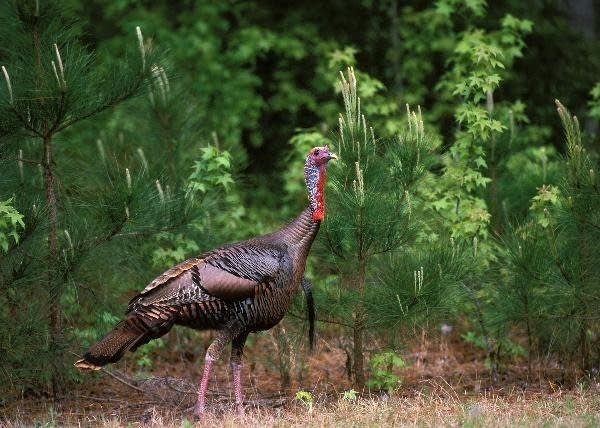Avian flu safety tips for wild turkey hunters
Go Deeper.
Create an account or log in to save stories.
Like this?
Thanks for liking this story! We have added it to a list of your favorite stories.

State officials are urging wild turkey hunters to protect themselves against avian flu during the next few weeks, even though the risk of contracting the disease is thought to be very low.
The virus has not been found in wild turkeys, but it has affected nearly 1.5 million commercial turkeys in the state.
Minnesota Department of Natural Resources Commissioner Tom Landwehr said if hunters see dead or sick birds while hunting, they should mark the location and notify the DNR so the agency can retrieve and test the birds.
Minnesota's turkey hunt begins Wednesday and continues through the end of May.
Turn Up Your Support
MPR News helps you turn down the noise and build shared understanding. Turn up your support for this public resource and keep trusted journalism accessible to all.
In-the-field safety tips from the DNR
• Do not harvest or handle wild birds that are obviously sick or found dead.
• Dress game birds in the field whenever possible.
• Use dedicated tools for cleaning game, whether in the field or at home. Do not use those tools around your poultry or pet birds.
• Always wear rubber gloves when cleaning game.
• Double bag the offal and feathers. Tie the inner bag, and be sure to take off your rubber gloves and leave them in the outer bag before tying it closed. Place the bag in a trash can that poultry and pet birds cannot access. This trash can should also be secure against access by children, pets or other animals.
• Wash hands with soap and water immediately after handling game. If soap and water are not available, use alcohol wipes.
• Wash all tools and work surfaces with soap and water. Then, disinfect them. Do not eat, drink or smoke while cleaning game.
At-home safety tips
• If you clean a bird at home, keep a separate pair of shoes to wear only in your game cleaning area. If this is not possible, wear rubber footwear and clean/disinfect your shoes before entering or leaving the area.
• Wash all tools and work surfaces with soap and water. Then, disinfect them.
• Avoid cross-contamination. Keep uncooked game in a separate container, away from cooked or ready-to-eat foods.
• Cook game meat thoroughly. Poultry should reach an internal temperature of 165 degrees F to kill disease organisms and parasites.



